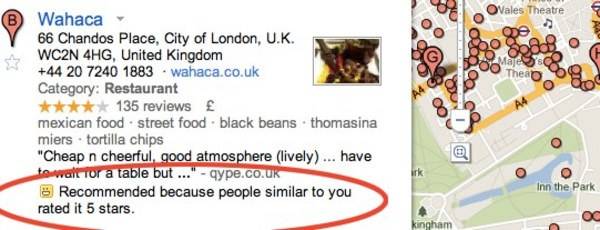Google’s Places today expanded its offerings to include restaurant and place recommendations in cities neither you nor anyone you know has recommended before. Recommendations to date have been because “you rated a place like this highly.” They now include places “rated highly by people like you.”

That might sound simple, but it’s important and, if the recommendations prove good, there’s probably some complicated math going on behind the scenes to determine what you’re like. Google leadership has said for months that its future lies not in serving up results in response to your search queries, but in telling you what you want to do before you even ask. There’s something about this news that brings that promise to mind for me.
The new recommendations will be served up in Google Maps search results, both on the desktop and in Google’s mobile apps.
Recommendation-as-a-service service Hunch began experimenting with efforts to point its “taste graph” technology at local venues last Spring (If You Like Men With Mustaches, You’ll Love These Restaurants) but the battle for effective recommendation technologies around real-world activity is likely just beginning.

The Age of the Algorithm
Some people argue, in fact, that this kind of taste detection and recommendation technology is part of a larger trend that will become a key part of the technology industry of the near-term future.
Dr. András Faragó, Computer Science Professor at the University of Dallas, said in an interview last week that we’re entering the Age of the Algorithm.
“While no one questions the value of software today, the underlying intellectual content, the algorithms, are still viewed by many as something without hard value. The value is still typically assigned to the implementation, not the algorithm. In a sense, algorithms up until very recently have had the same relationship to software implementation as software previously had to hardware: icing on the cake.
“On the other hand, there are more and more situations, as signified by the Heritage Provider Network’s $3 million prize (for early detection of people at high risk of later hospitalization), where the really hard part is finding the right algorithm. Once it is found, the implementation can be done by any skilled team, and I believe this may show the emergence of a trend in which in which the industry starts recognizing the real, hard value of sophisticated algorithms.”
In many cases, that hard-fought battle will end up looking to end users like low-key, smart recommendations of new restaurants in new cities.

















